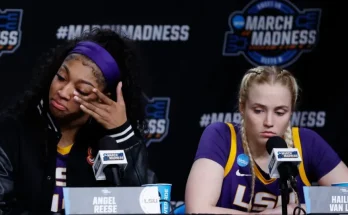In the new, supercharged era of the WNBA, where television ratings are shattering records and new fans are flocking to sold-out arenas, no one expects the league’s brightest stars to be quiet. But even by today’s standards, Angel Reese, the unapologetic and electrifying forward for the Chicago Sky, has ignited a firestorm with a few blunt words that have rocked the league to its core: “The WNBA don’t pay my bills at all.”
That single, stunning sentence, delivered casually during an Instagram Live session, has done more to expose the cavernous gap between player value and player pay than any formal negotiation ever could. Reese, a cultural phenomenon with a multi-million dollar brand built on endorsements with giants like Reebok and Hershey’s, revealed that her league salary of approximately $75,000 doesn’t even cover her monthly rent, which she stated was $8,000.

The comment immediately went viral, sparking a fierce, league-wide debate. To her legion of supporters, it was a raw and honest critique of a system that is failing to properly compensate the very athletes driving its unprecedented growth. To her detractors, it was the complaint of an ungrateful rookie, out of touch with the financial realities of a league that has fought for decades just to exist.
The backlash was swift. Critics on social media accused her of being selfish and shortsighted. The controversy was further inflamed by a widely circulated—and false—meme that attributed a quote to Reese saying, “Y’all make $1,400 a week I make $1,400 in 7 days.” While the quote was fabricated, it tapped into the raw nerve of the debate, blurring the lines between Reese’s actual advocacy and the public’s perception of it.
But if the critics expected the “Bayou Barbie” to back down, they fundamentally misunderstood the player and the person. Instead of retreating, Reese has fired back, leveraging her massive platform to double down on her stance and clarify her mission. When online critics told her she “can’t afford her rent,” she responded by posting on X (formerly Twitter) that she had just bought a house. She has made it clear that her fight isn’t just about her own bank account—it’s about forcing a systemic change for every player in the league.

This isn’t just about a single player’s salary; it’s about a looming war over the WNBA’s next Collective Bargaining Agreement (CBA). The players’ union opted out of the current agreement, and tense negotiations are underway for a new deal to take effect after the 2025 season. Reese has thrown herself into the center of this fight, becoming a powerful and outspoken voice for a new generation of financially empowered athletes.
She sent shockwaves through the league again when, on her podcast, she echoed the sentiment she’s hearing from players behind the scenes regarding the CBA talks: “I’ve got to get in the meetings, because I’m hearing like, ‘If y’all don’t give us what we want, we sitting out.’”
This wasn’t a threat that she would personally sit out, but rather a report from the front lines of player sentiment—a warning that the league’s stars are unified and prepared to leverage their collective power, potentially through a strike, to secure a fair deal. After one negotiation meeting, Reese called the league’s proposal “disrespectful,” signaling just how far apart the two sides are. Her non-negotiable demand? A fair share of the revenue. “The revenue shares, that’s really important for us,” she told ESPN. “We deserve it.”
The heart of the issue is a new and unprecedented financial paradox created by the Name, Image, and Likeness (NIL) revolution in college sports. For the first time in history, superstar female athletes are taking a massive pay cut to turn pro. Reese’s estimated NIL valuation at LSU was over $1.8 million. Her WNBA salary is less than 5% of that. While her lucrative endorsement deals continue, the official league check feels, as she put it, like a “bonus” rather than a primary income stream.
This new reality has given players like Reese and Caitlin Clark a level of financial independence and leverage never before seen in the WNBA. Previous generations of players needed their WNBA salary and often had to play overseas during the grueling off-season to make a viable living. While many still do, the new class of superstars doesn’t have the same financial constraints, freeing them to be more vocal and demanding in negotiations.
Reese’s candor has forced a long-overdue conversation out of the locker room and into the mainstream. The “Angel Reese Effect,” much like the “Caitlin Clark Effect,” is generating millions in ticket sales, merchandise, and media rights for the WNBA. Yet the players are still compensated under a CBA that was signed in 2020, before their arrival dramatically changed the league’s financial trajectory. They are, in essence, creating billion-dollar value while being paid based on a business model from four years ago.
By speaking out, Angel Reese has positioned herself as more than just a dominant force on the court. She has become a key figure in the labor movement that will define the future of women’s professional sports. Her message is clear: the era of players being grateful just to have a league is over. The era of demanding what they’re worth has begun, and she is unapologetically leading the charge.


